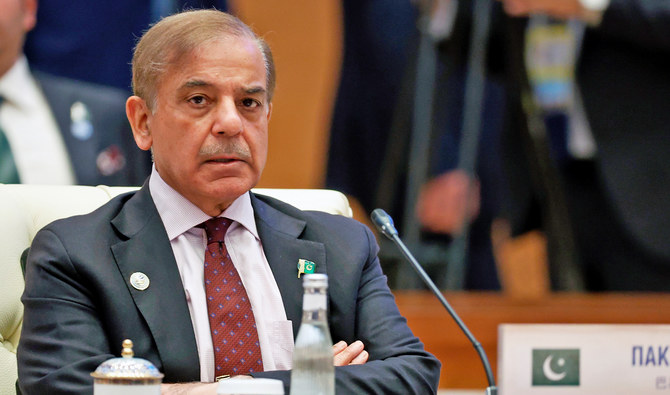
Ex-prime minister Shehbaz Sharif responds to questions from a group of young people at the central party headquarters about education.
X-Prime Minister Shehbaz Sharif of the PML-N met with a group of people who appeared to have been carefully chosen, as it seemed, as recipients of his government’s youth programs, a calculated strategy to avoid the dangers of interacting with young people in an unsupervised setting.
In his talk to the youth, Shehbaz Sharif stated that it is important to recognize the difficulties that today’s youth face. According to him, there is a need to close the knowledge and skill gaps that exist between what colleges teach and what businesses and job providers need.
The director of an American IT company that had profited from the E-Rozgar program asked the first inquiry. He talked on the discrepancy in the skills that universities teach and the capabilities that employers demand.
The major party secretariat in Lahore had black drapes hanging on its walls, giving the scene the appearance of a studio. The party president of the PML-N addressed a group of young people from all around the province on Monday at the central party headquarters.
Shehbaz bemoaned the fact that Pakistan’s overall IT exports were only Rs2.5 billion, despite the country having excellent IT talent. He blamed the lack of an appropriate incentive system for policy failures. He asserted that Pakistan may greatly benefit from an increase in IT exports.
The former prime minister declared that the empowerment of young, which can only be achieved through educational policy, should be the top priority for whoever administration takes office on February 8. He made the point that creating employment possibilities is the main obstacle in this regard, making it possible for those with degrees to support their families as the main providers of income. In addition, they can get employment in sports and overseas. Our children are quite talented in sports, especially cricket and hockey. But he regretted that most of this potential remains unrealized since there is no system in place to find brilliance.
The former prime minister stated that the administration that takes office on February 8 should place a high premium on empowering the youth, which can only be accomplished through educational policy. He emphasized that the primary barrier in this area is the creation of job opportunities, which enables those with degrees to serve as the primary breadwinners for their families. They can also work abroad and in the sports industry. Our kids are really skilled athletes, particularly in hockey and cricket.
Even if the country might not have enough gas or oil, he said, “we have a valuable resource in our youth.” Our losses and sufferings can become happiness and success if we give them the proper instruction. Surrounded by PML-N program beneficiaries, the guests’ inquiries during the event veered more toward an issue-centric focus than ordinary organic youth interactions.
Nearly all of the questions followed a predetermined format, beginning with praise for the programs they had benefited from and ending with inquiries about their respective fields of expertise.
It seemed to be an attempt to highlight the popularity of PML-N among young people, especially in view of the outcomes of student encounters with the acting prime minister and the interactive sessions held by media outlets, when students asked pointed and often acerbic questions.

Content writer, educationist, teacher, researcher, social media manager, and a SEO manager from lahore. She has been working as a freelance academic and non-academic writer for more than 10 years now. She has a passion to learn new things and has a knack for writing and she combines both things to produce write ups she pours her heart out in.

